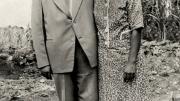Masauko Chipembere, Malawi’s premier nationalist, came to Harvard in the early 1970s as an exile, to write his autobiography and the biography of a freedom struggle in Africa that had not been concluded. Although the architect of Malawi’s 1964 independence, he had been unceremoniously hounded out of his country in 1965 by the autocrat he had mistakenly summoned home to lead the anti-colonial battle. Chipembere never saw his country again, dying young of complications from diabetes. His principled and incompletely fulfilled life reflects personal adversity and many of the political vicissitudes and disappointments of modern Africa.
The son of an Anglican archdeacon, Chipembere from an early age was both a rebel and a strong believer in natural justice. Once he returned home in 1954 from South Africa’s Fort Hare University College to join his British-controlled country’s battle for independence, Chipembere became its chief nationalist strategist and spokesman. His intelligence, determination, energy, integrity, and selflessness appealed to villagers, chiefs, his fellow legislators, and other Africans concerned with the political emergence of Malawi.
But Malawi’s nationalist movement had no supreme leader such as Ghana’s Kwame Nkrumah. The 27-year-old Chipembere, lacking personal ambition, fatally felt he would need “10 years or more of experience” to take charge; he feared making “a mess of things.” Instead, he persuaded Hastings Kamuzu Banda, then 59, an American-educated physician who had left Malawi about 1916 and never returned, to take up the mantle of political leadership. He and others built Banda up, messiah-like, and brought him home in 1958.
In late 1958, Chipembere decided the time was ripe to confront the colonial authorities. Despite a mild, self-effacing personal manner, he was a committed rabble-rouser who felt that Banda was too timid and set in his ways, and that the anticolonial temperature had to be raised if Malawaians were to gain freedom. The nationalists began holding political meetings throughout the protectorate, defying government bans. Early in 1959, Chipembere, Banda, and 200 followers were arrested. Banda and a few others were released more than a year later, but Chipembere was held until late 1960. Then, possibly with Banda’s connivance, he was prosecuted anew for sedition and inciting violence and jailed again, until early 1963. A British judge called him a man “corroded with racial hate.”
With Chipembere in prison, Banda took control of the Malawi Congress Party (MCP) and campaigned tirelessly. In mid 1961, Malawi’s eligible voters enthusiastically cast ballots for the MCP; a year later, Banda became leader of the Legislative Council and later prime minister, and Britain promised to let Malawi secede from the previously imposed Federation of Rhodesia and Nyasaland. On July 6, 1964, Malawi gained independence. Banda, originally promoted by Chipembere, had triumphed and Chipembere himself became minister of local government and of education.
All should have been well--but Banda had grown imperious. Younger party members soon resented his patriarchal approach; many differed with him on policy, such as his willingness to trade with apartheid South Africa and colonial Portugal. He opposed affirmative action and had created a paramilitary organization that terrorized ordinary Malawians and his own cabinet officers alike.
A month after the independence ceremony, most of the cabinet demanded that he cease behaving autocratically. With Chipembere in Canada on an official visit, Banda dismissed the dissidents. Chipembere rushed home to protest: “Rightly or wrongly,” he told parliament, “I regard myself as a man of some principles, a man of some honesty, a man of some courage, a man with some respect…I wouldn’t dare for a moment retreat from my principles…. It gives me a really heavy heart,” he added, that Malawi had broken down.
Then he returned to his rural home to raise a rebellion. He and a few hundred supporters tried to attack government outposts in early 1965, but did little damage; they were soon hunted down. Chipembere really had no stomach for war. Britain shepherded him to Tanzania and soon he was at UCLA, studying for a graduate degree in political science. He then taught in Tanzania before returning to UCLA in 1969 to complete his doctorate, be treated for diabetes, and teach at California State University, Los Angeles.
Starting in 1970 and continuing periodically to the eve of his death, he came east for the summers, to write laboriously his never-finished autobiography--an intensely personal, honest account of a vigorous life of leadership in politics and of personal integrity under stress. In conversations and in writing, he saw his decision to give up the leadership to Banda as well-intentioned but naïve, his rebellion as driven more by integrity than reality.
He did not live to see the end of Banda’s dictatorship in 1993 and the development of true democracy in Malawi. But once Banda was replaced, Chipembere was immediately rehabilitated as a national hero. In 2002, then-president Bakili Muluzi and other national leaders celebrated the publication of his autobiography in Malawi. Its title, Hero of the Nation, is fitting, for Chipembere is remembered at home as a towering founder of the republic.








